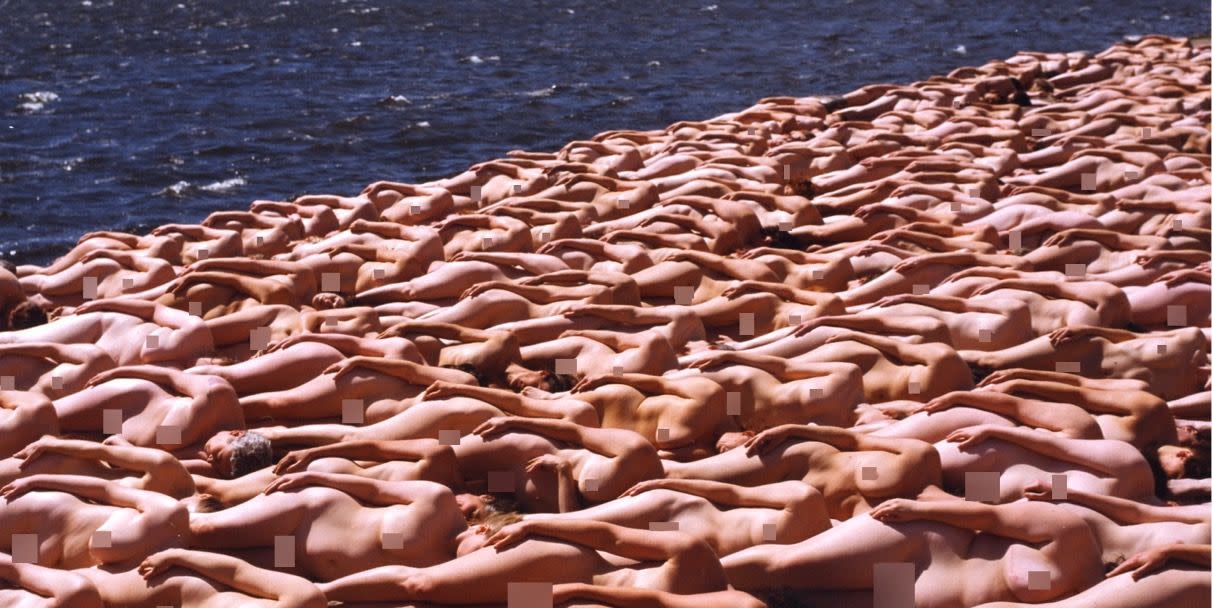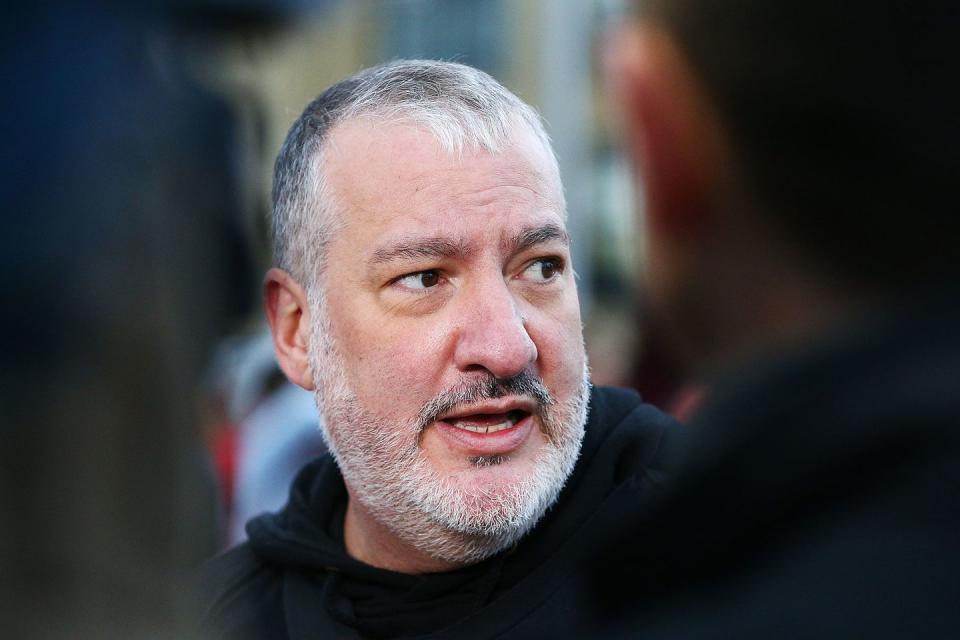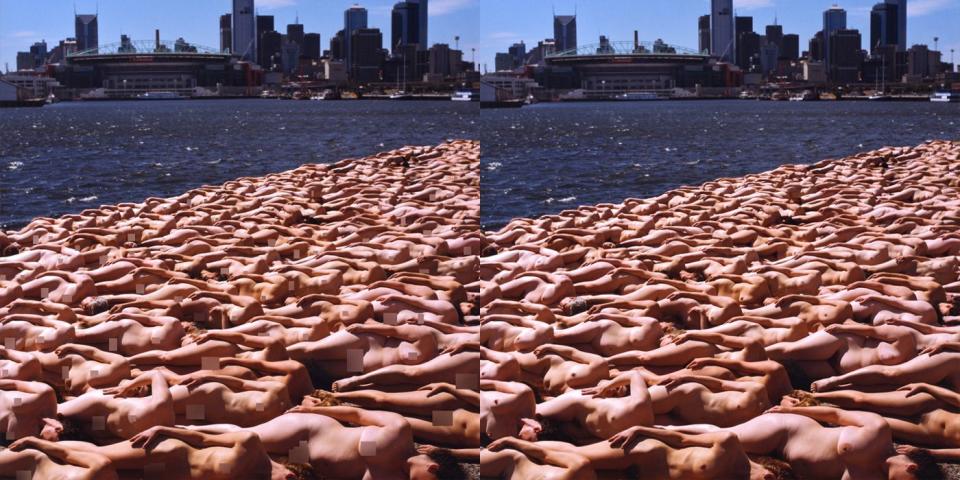100 People Will Pose Nude in NYC to Challenge Instagram and Facebook's Censorship

Artist Spencer Tunick has battled Facebook and Instagram over its stringent "community guidelines" banning nudity for half a decade. Tunick, who organizes and photographs large groups of nude people around the world, first had his Facebook page disabled in 2014 after posting a carefully pixelated image of 75 women in Portugal. Apparently the color gradiations in the nipples were too visible. Since then, it's been a push and pull of meticulously censoring his artwork in hopes the images won't be removed-or worse, his account deactivated.
But now, he's sending a powerful message directly to those social media platforms. On June 2, between 100 and 200 people will gather in New York City, posing naked to challenge Instagram and Facebook's nudity policies. Tunick and the National Coalition Against Censorship are organizing the project, called #WeTheNipple, with the goal of convincing the social platforms to allow artistic photographic nudity.
A post shared by Spencer Tunick (@spencertunick) on Mar 9, 2019 at 3:11pm PST
"I get it. I don’t want my daughters on an Instagram full of pornography," Tunick tells Esquire. (He has a 12-year-old and a 14-year-old.) "But there has to be a way artists can have a voice to show their works. There has to be some formula, whether it’s the YouTube way where you’re reviewed and there’s an 18-or-older button that’s pressed. Or, for starters, equalize the male and female nipple and not deem the female nipple as violent."
Netherlands (Amsterdam) #arch #artfabrication
A post shared by Spencer Tunick (@spencertunick) on Mar 24, 2019 at 10:50am PDT
Instagram's current community guildline reads:
We know that there are times when people might want to share nude images that are artistic or creative in nature, but for a variety of reasons, we don’t allow nudity on Instagram. This includes photos, videos, and some digitally-created content that show sexual intercourse, genitals, and close-ups of fully-nude buttocks. It also includes some photos of female nipples, but photos of post-mastectomy scarring and women actively breastfeeding are allowed. Nudity in photos of paintings and sculptures is OK, too.
So, in effect, certain artistic portrayals of nudity-sculpture and painting-can exist on the platforms, but not photography. And, of course, male nipples are A-OK while most female nipples are not.
#Munich #Germany #munichopera @bayerischestaatsoper #bayerischestaatsoper
A post shared by Spencer Tunick (@spencertunick) on Feb 20, 2019 at 11:08am PST
Censorship is often a First Amendment argument, according to Nora Pelizzari, director of communications for the National Coalition Against Censorship. But when that conversation shifts to the social networks, the First Amendment "flies out the window."
"These are private actors who are free to set nudity guidelines, and by using their platforms you are bound by them," she says. "That’s the nature of the game."
However, these platforms are also becoming the public sphere as more people share art on Facebook and Instagram, Pelizzari continues. As a result, these are the places people discover art. "It feels disingenuous for someone like Instagram to purport to be a platform for artists and sharing new visual modes of expression and abide by these fairly arbitrary, certainly outdated, and very, very, very subjective ideas of ‘appropriate’ content," she says.
A spokesperson for Instagram said in an emailed statement that the company strives to create "a safe and respectful environment." The spokesperson added: "While countries and cultures around the world have differing views of what is considered appropriate, we do our best to reflect these diverse values in our Community Guidelines."

Facebook, which has more than 2.3 billion active users, and Instagram, which surpassed 1 billion last year, have significant impacts on cultural norms, so their guidelines affect more than just the artists they limit.
"I think if the world of the naked body is reduced to cartoons as nude or painting or sculpture and the opposite of that is no nudes on social media, there’s no in between," Tunick says. "When you have these extremes, a chaotic state of censorship exists. I feel it changes the perception of how we view the female body. If you can be a male nipple and not a female nipple, the public starts to think of the female nipple as crime.”
A post shared by Spencer Tunick (@spencertunick) on Mar 5, 2019 at 1:32pm PST
That binary can be additionally frustrating, not to mention limiting, for the LBGTQ community.
"The idea that you can look at a nipple and determine if that human being is presenting as female or male or that their gender is binary is a misuse of nudity screens," says Pelizzari. "A lot of photographers who focus on the body are grappling with issues of gender, and trans and queer artists who photograph their own bodies or the bodies of those in their communities are disproportionately affected by this because of definitions of what is or isn’t nudity."

Recently, Facebook and Instagram announced that they were going one step further to demote content that doesn't violate their community guidelines but that it deems "inappropriate." Tunick saw the effects of these changes when his pixelated photos were appearing on his main Instagram feed but not showing up when you searched the innocuous hashtags-like those indicating the locations of the photos-he was adding to his captions.
A post shared by Spencer Tunick (@spencertunick) on Sep 15, 2018 at 2:29pm PDT
For some time, Tunick was able to comply with the social media platforms' policies, thanks to a personal connection. A friend's brother worked at Facebook and introduced Tunick to a contact who would personally sign off on Tunick's photographs before he posted them. The guidance was usually that images were too close-up and needed to be zoomed out.
Tunick, who has 65,000 followers on Facebook and 113,000 on Instagram and has the blue verification checkmark on each, was able to disseminate his artwork and use the platforms to put out casting calls for his projects. But when his contact left the company, he lost his inside line, and now holds his breath with new posts, each painstakingly pixelated, worried he'll lose his platform.
A post shared by Spencer Tunick (@spencertunick) on Jun 16, 2018 at 9:14am PDT
The National Coalition Against Censorship, a coalition of more than 50 national non-profits that combat overly restrictive obscenity laws, has had success working with social media platforms in the past. A decade ago, it worked with the Electronic Frontier Foundation, a digital rights group, to get YouTube to change their terms of service. The platform now more narrowly defines what would not count as artistic nudity by saying: "Explicit content meant to be sexually gratifying (like pornography) is not allowed on YouTube. Videos containing fetish content will be removed or age-restricted."
Last last year, the coalition began talks about a way to address Instagram and Facebook with Tunick, who has for years used his art to make social and political statements with more than 75 installations around with world. In the summer of 2016, Tunick organized "Everything She Says Means Everything" in Cleveland for the Republican National Convention to send a message to then-candidate Donald Trump. For that project, 100 nude women gathered near the site of the convention.
A post shared by Spencer Tunick (@spencertunick) on Mar 8, 2017 at 10:24am PST
Tunick is keeping some details of what will happen on June 2 quiet for now. But he will say: "It will be over 100 people men and women posing in an artwork. The artwork I make will be meant to be shared on social media without the threat of it being taken down.
"My objective is to make a photograph that really makes everyone think about all the issues."
('You Might Also Like',)

